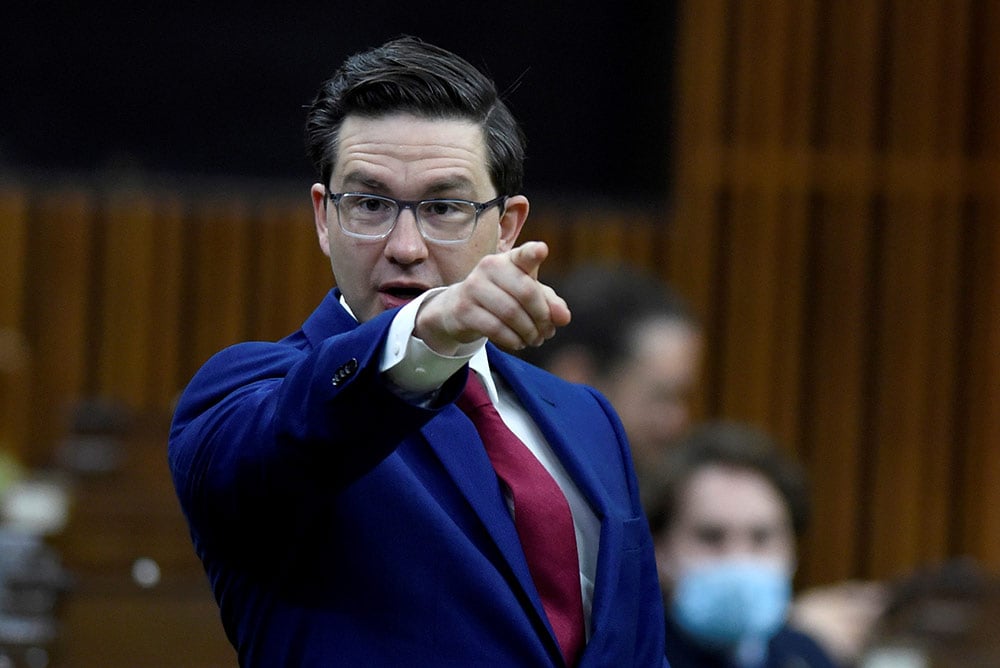For Ottawa-based Conservative MP Pierre Poilievre, the noisy and obstructive truck convoy that has occupied the nation’s capital must have presented a real political dilemma. The right-wing rabble-rousers are Poilievre’s people, his core constituency. On the other hand, there are the residents of Ottawa. After all, they elected him.
Poilievre seems to have made his choice. He may represent the Ottawa riding of Carleton, but that inconvenient fact does not appear to be top of mind for the former minister of employment and social development. Instead, his Twitter feed is full of photos with, and praise for, the “joyful and peaceful” convoy participants who choose “freedom over fear.”
In the short run, the strategy may be paying dividends. While the race to replace Erin O’Toole as leader is barely underway, Poilievre is the clear early front-runner. In media interviews with several of the MPs who helped topple O’Toole, it was Poilievre’s name that came up most frequently.
The Conservative Party of Canada has been going through its own elongated Year of Four Emperors as it searches desperately for its new Stephen Harper. Before O’Toole, it was Andrew Scheer’s turn to fall on his sword. At that time Poilievre was reportedly interested in replacing Scheer. But in January 2020, Poilievre announced he would not make a leadership bid, citing family reasons.
Now it’s 2022. Poilievre still has a family but apparently no more reasons. This time he gives every indication of being ready to race.
Pierre Marcel Poilievre was born in 1979 and grew up in Calgary. He was adopted at birth and raised by a Franco-Albertan couple. That probably explains why Poilievre speaks fluent French with a bit of a Jason Kenney accent. The Kenney influence is also present elsewhere. In 1995, when a typical Calgary 16-year-old might have been cleaning up the parking lot at Peters’ Drive-In and saving up to buy a 1984 Chevy Citation, a teenage Poilievre was already selling Reform party memberships for Kenney.
Eventually Poilievre found work as an assistant to Canadian Alliance leader Stockwell Day, a job that took him to Ottawa. Soon he would go his one-time political role model one better. While Kenney had been elected to Parliament at the tender age of 29, Poilievre was just a few weeks past his 25th birthday when he defeated Liberal defence minister David Pratt in the then-riding of Nepean-Carleton in 2004. He has been an MP ever since. Poilievre first made an impression on Harper as a parliamentary secretary who demonstrated a ruthless attacking style. He was duly rewarded with promotion, at one point holding dual portfolios in the Harper cabinet.
Comparisons with Kenney do not stop with their youthful beginnings and shared Alberta roots. Just as Kenney developed a reputation for treating the electoral rules with contempt, Poilievre too has played rough in his federal career.
In 2015, he was point man for the Harper government’s Fair Elections Act, a Republican-style attempt at voter suppression that ran into concerted opposition and was eventually gutted, but not before Poilievre launched nasty personal attacks against Chief Electoral Officer Marc Mayrand.
“He wants more power, a bigger budget, and less accountability,” Poilievre charged of the non-partisan appointee, subsequently refusing to apologize for his remarks in the House.
Poilievre was also nailed for using public funds on a 2015 partisan political video. Once in Opposition, Poilievre maintained his aggressive approach, staging a one-man filibuster of the Liberal budget in 2019. It’s this relentlessly partisan style that has made Poilievre the darling of the Conservative grassroots.
The last two leaders chosen by the Conservative party both positioned themselves to the centre-right for the party faithful before heading out to woo the Canadian public at large. While Scheer seemed intent on becoming Harper 2.0, O’Toole made at least some attempts to broaden the base by urging the party (unsuccessfully) to accept climate change and then leading his caucus to unanimously pass Bill C-4, a ban on conversion therapy. It is the latter move that seems to have inspired the subsequent Groundhog Day Massacre. Last June, more than 40 Conservative MPs originally voted against Bill C-4 and it seems some never forgave O’Toole for their own forced conversions.
Poilievre was not among the so-called “conversion crew” — in the June vote he supported the ban. He is also on the record as pro-choice (although he also says he would allow MPs to vote their conscience on the issue).
And yet the right wing of the party clearly see him as one of their own. While O’Toole attempted to reach out to the Conservative right, for Poilievre it does not appear to be much of a stretch. His whole-hearted support of the truck convoy has neatly separated him from O’Toole’s more cautious approach, and Poilievre has been vocal in his opposition to vaccine mandates.
His embrace of the fringe is not new — previously Poilievre has coyly dropped references to the “Great Reset,” a conspiracy theory about sinister global elites that thrives among those who sometimes chant “Jews will not replace us.”
Will Poilievre’s support of the truck convoy backfire? This week, an embarrassing video clip of Poilievre demanding the dismantling of a First Nations blockade has been circulating online. “All hell is breaking loose,” Poilievre told Vassy Kapelos on CBC’s Power & Politics early in 2020. “These blockaders are taking away the freedom of other people to move themselves and their goods where they want to go and that is wrong.”
Meanwhile, he tore into Catherine McKenna for suggesting that he stands with Confederate flag- and swastika-wavers. “You are a liar Ms. McKenna,” he tweeted. “I stood with no such flags. You support a man who dressed up in racist costumes so often he lost count and targeted and expelled racial minorities in his own caucus because they would not fall in line. Confront your leader’s racist conduct.”
Poilievre’s calculation is not hard to divine. Support for the convoy now will win him the votes of the Tory MPs who plunged their daggers into O’Toole. And by the time a general election rolls around the truckers will be long gone from the evening news. The focus will have shifted, likely to government policy and/or scandal.
At 42, Poilievre is already a parliamentary veteran, yet maintains the aura of the rising young tyro. His cutthroat manner is particularly attractive to party diehards dissatisfied with O’Toole’s kinder, gentler soft-sell.
Poilievre’s Ayn Rand principles and defiantly right-wing politics may seem too extreme for general election success. But few of his political opponents are likely to sell him short. He is smart, well-spoken and fearless. He can also count on public fatigue with Liberal rule which, even if it doesn’t swing voters to the Conservatives, might at least depress Liberal turnout.
That could be enough. The Conservative rank and file, frustrated by failure yet still determined to run right, are looking for a leader who can combine ideological purity with electability. For the Canadian right, the prospect of a Prime Minister Poilievre will look tantalizingly real. ![]()
Read more: Rights + Justice, Federal Politics
















Tyee Commenting Guidelines
Comments that violate guidelines risk being deleted, and violations may result in a temporary or permanent user ban. Maintain the spirit of good conversation to stay in the discussion.
*Please note The Tyee is not a forum for spreading misinformation about COVID-19, denying its existence or minimizing its risk to public health.
Do:
Do not: